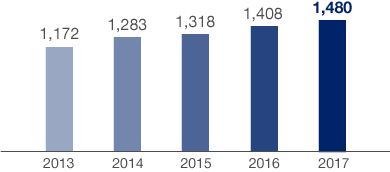Intermodal Segment
in € million |
2017 |
2016 |
Change |
|||
Revenue |
414.0 |
390.1 |
6.1 % |
|||
EBITDA |
95.0 |
79.6 |
19.3 % |
|||
EBITDA margin in % |
22.9 |
20.4 |
2.5 pp |
|||
EBIT |
69.9 |
55.9 |
25.1 % |
|||
EBIT margin in % |
16.9 |
14.3 |
2.6 pp |
|||
Container transport in thousand TEU |
1,480 |
1,408 |
5.2 % |
HHLA’s transport companies achieved significant growth in the highly competitive market for container traffic in the hinterland of major seaports. Transport volumes rose by 5.2 % to 1,480 thousand standard containers (TEU), compared with 1,408 thousand TEU in the same period last year. This trend was driven by growth in both rail and road transportation. Compared with the previous year, rail transportation rose by a further 4.7 % to 1,140 thousand TEU (previous year: 1,089 thousand TEU). In particular, there was above-average growth in connections between the Adriatic ports and the Central and Eastern Europe hinterland. Continental cargo volumes rose strongly, too. Despite the challenging market environment, road transport also made very good progress with year-on-year growth of 6.8 % to 340 thousand TEU (previous year: 319 thousand TEU) due to strong freight volumes in the greater Hamburg area.
Development in Container Transport
in thousand TEU

With growth of 6.1 % to € 414.0 million (previous year: € 390.1 million), revenue performed slightly better than transport volumes. The marginal decline in rail’s share of HHLA’s total intermodal transportation from 77.4 % to 77.0 % was more than offset by longer transport distances in rail transport.
The operating result (EBIT) increased year-on-year to € 69.9 million (previous year: € 55.9 million) and thus clearly outperformed the volume and revenue trend. The improvement in earnings was mainly due to increased transport volumes and further gains in train capacity utilisation. Earnings in the previous year were also depressed by additional expenses of € 7.2 million pertaining to a lease for a terminal site in Poland.
HHLA continues to invest as needed in the expansion of its intermodal network. HHLA’s rail subsidiary METRANS put six new multi-system locomotives into operation in the first half of 2017. It now has more than 70 shunters and locomotives and a fleet of over 2,500 waggons. In June 2017, the fourth METRANS hub terminal was also officially opened in Budapest. With this facility, HHLA is expanding its hinterland network to include another strategic hub. Its location in the heart of Europe makes it the perfect interface between the North European seaports, the Adriatic, and Central, East and South-East Europe. The network of the HHLA rail subsidiaries METRANS and POLZUG therefore consists of 13 terminals in the hinterland, five of which function as large hub terminals.
Work to integrate POLZUG’s activities into the METRANS organisation commenced in the past financial year. By pooling activities, the company aims to streamline structures and processes, thereby enabling synergies to be realised.
A port’s catchment area.
A TEU is a 20-foot standard container, used as a unit for measuring container volumes. A 20-foot standard container is 6.06 metres long, 2.44 metres wide and 2.59 metres high.
A TEU is a 20-foot standard container, used as a unit for measuring container volumes. A 20-foot standard container is 6.06 metres long, 2.44 metres wide and 2.59 metres high.
A TEU is a 20-foot standard container, used as a unit for measuring container volumes. A 20-foot standard container is 6.06 metres long, 2.44 metres wide and 2.59 metres high.
Transportation via several modes of transport (water, rail, road) combining the specific advantages of the respective carriers.
Revenue from sales or lettings and from services rendered, less sales deductions and VAT.
In maritime logistics, a terminal is a facility where freight transported by various modes of transport is handled.
A terminal which bundles and distributes consignments as a handling hub. HHLA’s rail companies operate hub terminals like this in Ceska Trebova, Budapest, Dunajska Streda, Poznan and Prague.
A port’s catchment area.